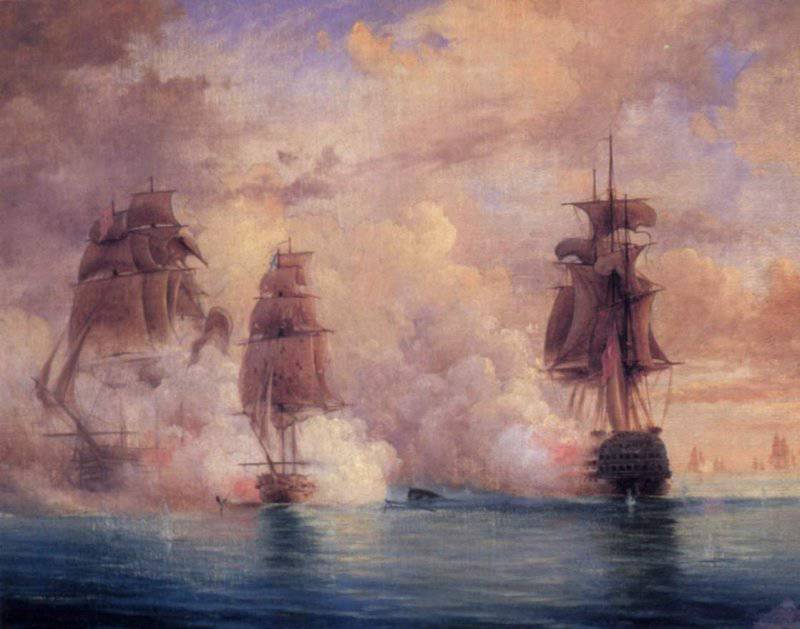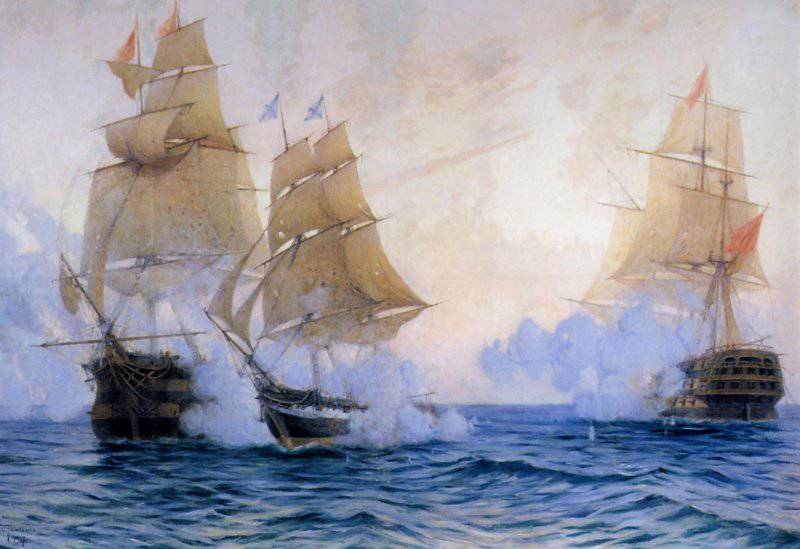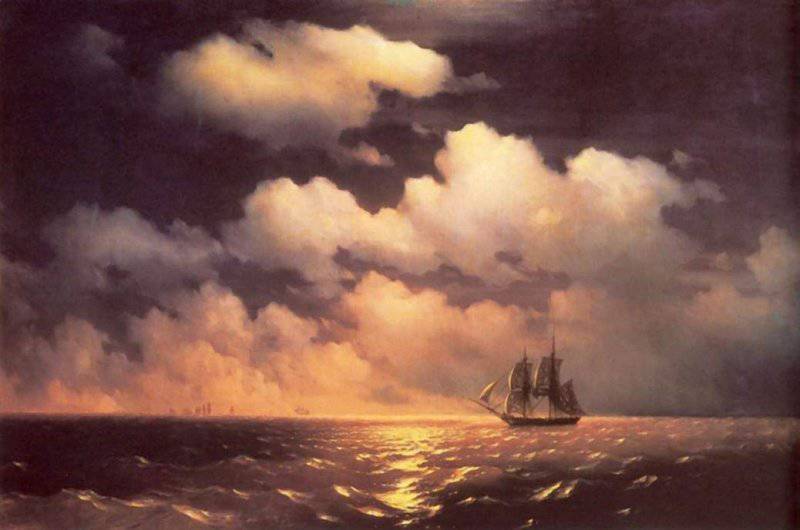Brig "Mercury" - miracles of courage under the auspices of St. Nicholas
Built at the Sevastopol shipyard of bog oak, the thirty-meter hull of the ship was equipped with eighteen carronades and two portable implements. The carronades were a thin-walled cast-iron cannon with a short barrel weighing twenty-four pounds. The stern was decorated with a statue of the Roman god Mercury, the ship had sails and, according to 7, were oars on both sides.
The handsome ship sailed for the first voyage on May 1820 of the year, the crew was assigned to perform patrol and reconnaissance missions along the coast of Abkhazia. Smugglers were considered to be the scourge of coastal waters, causing significant damage to the maritime riches of the region. Up to 1828, the Mercury did not participate in the battles. However, when the Russian-Turkish war began, the brig took part in the battles for the capture of fortresses: Varna, Anapa, Burchak, Inada and Sizopol. In these battles, the brig distinguished itself by taking two Turkish ships with an enemy landing party.
The commander of the brig "Mercury" in 1829 was the young handsome captain-lieutenant Alexander Ivanovich Kazarsky, who by that time had experience in the naval service. Already in the 14 years, Alexander came to the fleet as a simple volunteer, and then graduated from the Nikolaev cadet school. In 1813, Kazarsky was taken as a midshipman to the Black Sea Fleet, and after a year he reached the midshipman.
The brigantines, on which Kazarsky served, transported cargoes, so the tactics of naval combat had to be mastered only theoretically. Some time later, Kazarsky was appointed commander of rowing ships in Izmail, he received the rank of lieutenant in the 1819 year. His service continues on the frigate "Evstafy" under the command of Ivan Semenovich Skalovsky on the Black Sea. The rear admiral willingly conveyed his experience to the diligent student and brave officer Kazarsky.
Being the commander of the transport vessel "Rival", carrying weaponKazarsky participated in the siege of Anapa. For this, he had to convert this ship into a bombing ship. For three weeks he fired at the fortifications of the fortress, and the Opponent received serious damage to the mast and many holes in the hull. For this fight, Kazarsky received the rank of lieutenant commander, and a little later in the same 1828 year, Alexander Ivanovich was awarded a golden saber for taking Varna.
14 May 1829, the ship "Mercury" under the command of Kazarsky conducted a sentinel raid together with the frigate "Standart" and the brig "Orpheus". The task of the raid was to monitor the movement of the enemy. Suddenly, a Turkish squadron of ships appeared from the east. Since there were no opportunities to join the battle in the three sentinel ships, the command decided to move north. The enemy outnumbered the number and equipment of the ships, so he immediately organized a chase. Fourteen enemy ships were inferior in speed to the "Standard" and "Orpheus", but the "Mercury" with battered sails soon began to lag behind.
Soon the abandoned brig was overtaken by two large enemy battleships.
Realizing that they would not be able to leave, the commander assembled a council of officers. The old sea custom gave the first word to the junior ranks, in accordance with it, the question of further actions was asked to the lieutenant of the navigator corps Prokofiev. Without thinking, the lieutenant offered to join the enemy in battle and fight to the last projectile and man. The sailors supported the decision of their command loud: “Hurray!”
The entire crew of the team changed into ceremonial uniforms with dazzling white panties. To raise morale, a prayer was read to Saint Nicholas, the heavenly patron of sailors. There were words in that prayer: “you will not leave us at death hour, save our conscience and souls from weakness, save and save ...”. As subsequent events showed, the saint heard the words of believers.
In a secret place on the steeple put a loaded gun, so that the last of the survivors could shoot in the hold, filled with gunpowder. The stern flag was nailed to the gaff, so that under no circumstances could it be pulled down. Lieutenant Skaryatin S.I. was responsible for the sails and spars on the orders of the captain, F.Novosilsky - for artillery, I.P. Prokofyev, navigator. was responsible for the shooters, the midshipman Prithupov DP should engage in the firefighting and extinguishing of fires, and the captain took over the maneuvering of the ship. In the event of his death, Kazarsky ordered S.Skyaratinu to take command. All secret documents and maps burned before the battle, so that they could not get to the enemy.
The three-armed Turkish ship Selimiye, which had one hundred and ten guns on board, attempted to enter from the stern. After the first volleys from the enemy received an order to surrender, but the team responded with fierce shooting. A fight started. A huge thirty-pound core struck the side of the Mercury and killed two sailors. The commander skillfully maneuvered the "Mercury", so that most of the enemy shells did not reach the goal and only sailed the sail. Skillful maneuvers were accompanied by volleys from all guns. The gunners beat aimingly at the spars in order to put the enemy ships out of action, so the Turks had few human losses. Shcherbakov and Lysenko succeeded: Kazarsky came very close to Selim, so that the shells could hit the target. Marcel and Bramsel immediately hung on a linear vessel Kapudan-pasha. Having received a strong injury, Selim was forced to stop the fight and go into a drift. However, in the end he knocked out one of the guns of "Mercury" in one gulp.
A volley of the Turkish ship pierced the Mercury’s hull below the waterline, the threat of flooding hung over the brave brig. Sailor Gusev and midshipman Pritupov rushed to the hole. Gusev closed the hole with his back and demanded to press him to it with a log, only after shouts accompanied by a strong abuse, the midshipman subordinated to the sailor and eliminated the flow, hitting the hero as a patch.
The second Turkish two-ship “Real Bey”, having seventy-four cannons on board, attacked the Mercury from the left side. There was a fire on the brig three times, but the cohesive team fought to the last. The fire was quickly extinguished, there were numerous damages in the hull, spars, sails and rigging. From the shots it was impossible to dodge, it remained only to attack with retaliatory strikes and well-aimed shots were finally killed by the for-brahm-ray, main-channel and knock-for-mars-ray of the enemy. Fallen licels and sails closed the holes for the guns, as a result, “Real Bay” could not continue the fight and left the battle. The Turkish squadron command realized that the brave brig would go to the bottom rather than surrender and chose to let him go. A proud ship with great damage headed towards Sisopol. The crew was happy, although there were losses among the sailors as well. The battle lasted three hours and from the team at 115 people, four were killed, six were injured. Kazarsky himself was wounded in the head, but, after dressing with a handkerchief, he continued command.
Two days earlier, the Russian frigate Rafail was in a similar situation, commanded by a former commander of Mercury, a captain of the second rank Stroynikov. The frigate surrendered and, by coincidence, Stroynikov was taken prisoner on May 14 on the battleship Real Bey. He witnessed the brave battle of the team and the skillful maneuvering of the young captain. Stroynikov’s cowardly act infuriated Emperor Nicholas I, so he ordered that Raphael be burned as soon as he was beaten off by the enemy. The imperial order was executed a little later.
1 August 1829 “Mercury” was repaired in Sevastopol and allowed to cruise to Sisopol. The battle of the brave team became the pride of not only Russians, but even the Turks enthusiastically spoke of this battle, calling the team of the brave brig heroes.
At the beginning of May, St. George's flag and a pennant, which was granted a heroic battle to the ship, flew over the "Mercury" in 1830. Kazarsky and lieutenant Prokofiev were awarded the Order of St. George 4 degree. Kazarsky, by decree of the emperor, was promoted to captain of the 2 rank and appointed a wing adjutant. The orders of St. Vladimir with the bow were awarded to the entire officer staff of the ship with the elevation of rank and the right to place the image of a pistol on the family coat of arms. The pistol was supposed to represent the very one with whom the last of the team was to blow up the brig.
A lot of ships were named after the two-masted "Mercury", they are called like this today. The courage of the team and its glorious commander will remain forever in the Russian stories. Already after the tragic death of Kazarsky, not related to fleet, in 1834 in Sevastopol a monument was laid in honor of the captain, the heroic brig and his team more than 5 meters high. The inscription on the monument: "Kazarsky. To posterity as an example. "
The navigator Ivan Petrovich Prokofiev was in charge of the Sevastopol Telegraph in 1830, then he participated in the defense of Sevastopol 1854-1855. Only in 1860, Prokofiev resigned. The monument to the brave navigator is installed after his death in 1865 year.
Fyodor Mikhailovich Novosilsky, who participated in the May battle on the “Mercury” as a lieutenant, continued to serve in the navy until the rank of vice-admiral, earned numerous orders, a golden sword with diamonds and other rewards for courage.
Skaryatin Sergey Iosifovich, on the "Mercury" another lieutenant, later commanded other vessels, was awarded the Order of St. George. He quit his job as a captain of the 1 rank in the 1842 year.
Pritupov Dmitry Petrovich - the midshipman of the brave brig later left the service due to illness with the rank of lieutenant in 1837, providing himself with a double salary until the last days.




Information